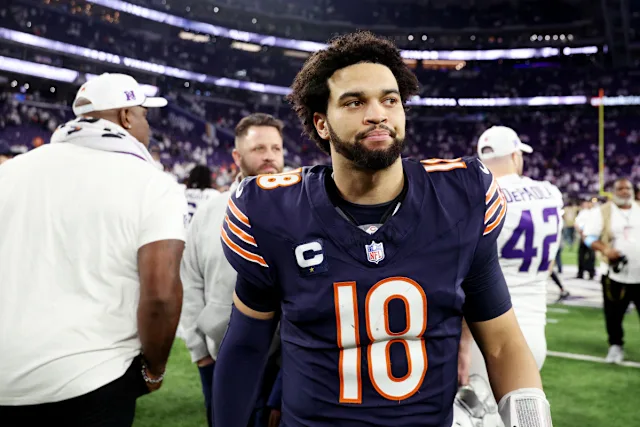In the 2024 NFL season, the Chicago Bears fielded the league’s worst offense in terms of total yardage, averaging just 284.6 yards per game. The underwhelming performance was attributed to a variety of factors, ranging from coaching instability to a weak running game and significant protection issues for rookie quarterback Caleb Williams. However, a closer look at the numbers suggests that Williams may deserve more scrutiny than he initially received.
The season was marred early on by coaching turnover. Both head coach Matt Eberflus and offensive coordinator Shane Waldron were dismissed, a move that indicated deeper problems within the organization. Compounding the turmoil was the offensive line’s inability to establish a reliable ground attack. Chicago finished 25th in rushing offense, averaging a mere 102 yards per game. Additionally, the Bears allowed a staggering 68 sacks — the highest in the NFL — prompting concerns over the offensive line’s competency.

However, data released by Pro Football Focus (PFF) paints a more nuanced picture. According to PFF’s 2024 pass-blocking grades, the Bears were tied for eighth-best in the league with the Atlanta Falcons, scoring a 72.8. This revelation challenges the narrative that poor protection was the primary cause of the offensive struggles and shifts some accountability back to the quarterback. In comparison, the Denver Broncos and Tampa Bay Buccaneers led the league in this metric, with scores of 83.5 and 83.3 respectively.
Chicago’s offensive line went through a major overhaul heading into the 2025 season. The Bears replaced their entire interior line, signing veteran left guard Joe Thuney, center Drew Dalman, and right guard Jonah Jackson in an effort to solidify protection and revive the running game. Despite these efforts, the lack of production on the ground persisted throughout 2024, raising questions about execution rather than personnel.
Caleb Williams, the No. 1 overall pick in the 2024 NFL Draft, was initially spared widespread criticism. However, further evaluation suggests he struggled under pressure, often failing to trust his blockers. Rather than standing tall in the pocket, Williams frequently fled prematurely, leading to unnecessary sacks and stalled drives. This hesitation limited the offense’s rhythm and effectiveness.
New head coach Ben Johnson is now tasked with maximizing Williams’ potential. A core focus of offseason training has been helping the young quarterback improve his pocket awareness and decision-making under pressure. Johnson emphasizes the need for Williams to make quicker, more confident reads while also using his athleticism to create plays outside of structure.
With the offensive line revamped and additional weapons added to the offense, Williams enters the 2025 season without the benefit of excuses. The conditions are now in place for him to succeed — and the spotlight will be firmly on him to deliver.










